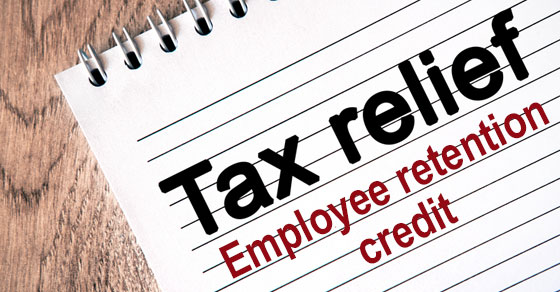
In Notice 2021-61, the IRS recently announced 2022 cost-of-living adjustments to dollar limits and thresholds for qualified retirement plans. Here are some highlights:
Elective deferrals. The annual limit on elective deferrals (employee contributions) will increase from $19,500 to $20,500 for 401(k), 403(b) and 457 plans. As well as for Salary Reduction Simplified Employee Pensions (SARSEPs). The annual limit will rise to $14,000, up from $13,500, for Savings Incentive Match Plans for Employees (SIMPLEs) and IRAs.
Catch-up contributions. The annual limit on catch-up contributions for individuals age 50 and over remains at $6,500 for 401(k), 403(b) and 457 plans, as well as for SARSEPs. It also stays at $3,000 for SIMPLEs and SIMPLE IRAs.
Annual additions. The limit on annual additions — that is, employer contributions plus employee contributions — to 401(k)s and other defined contribution plans will increase from $58,000 to $61,000.
Compensation. The annual limit on compensation that can be taken into account for contributions and deductions will increase from $290,000 to $305,000 for 401(k)s and other plans. This includes Simplified Employee Pensions (SEPs) and SARSEPs.
Highly compensated employees (HCEs). The threshold for determining who is an HCE will increase from $130,000 to $135,000.
Key employees. The threshold for determining whether an officer is a “key employee” under the top-heavy rules, as well as the cafeteria plan nondiscrimination rules, will increase from $185,000 to $200,000.
Participation in a SEP or SARSEP. The threshold for determining participation in either type of plan will remain $650.
Business owners, along with their HR and benefits staff or providers, should carefully note when the new limits and thresholds apply. Sometimes the answer isn’t obvious. The 2022 compensation threshold used to identify HCEs will be generally used by 401(k) plans for 2023 nondiscrimination testing.
Review your employee communications, plan procedures and administrative forms, updating them as necessary to reflect these changes. Whether your company offers a 401(k) or another type of plan, we can provide further information on the tax rules.
In Notice 2021-61, the IRS recently announced 2022 cost-of-living adjustments to dollar limits and thresholds for qualified retirement plans. Businesses that offer a qualified plan, such as a 401(k), should take careful note. For example, the annual limit on elective deferrals will increase from $19,500 to $20,500 for 401(k), 403(b) and 457 plans, as well as for SARSEPs. The annual limit on compensation that can be taken into account for contributions and deductions will increase from $290,000 to $305,000. However, the annual limit on catch-up contributions for those age 50 and over will remain the same at $6,500. We can provide further information on the adjusted amounts.
Business owners: If your company offers a qualified retirement plan, such as a 401(k), you need to know how the IRS recently adjusted many of the key dollar limits and thresholds related to plan administration.

Employers offer 401(k) plans for many reasons, including attracting and retaining talent. These plans help an employee accumulate a retirement nest egg on a tax-advantaged basis. If you’re thinking about participating in a plan at work, here are some of the features.
Under a 401(k) plan, you have the option of setting aside a number of your wages in a retirement plan. By setting cash aside in a 401(k), you’ll reduce your gross income, and defer tax until you cash out. It will either be distributed from the plan or from an IRA or other plan that you roll your proceeds into after leaving your job.
Your wage will be reduced by the amount of pre-tax contributions that you make — saving you current income taxes. But the amounts will still be subject to Social Security and Medicare taxes. If your employer’s plan allows, you may instead make all, or some, contributions on an after-tax basis (these are Roth 401(k) contributions). With Roth 401(k) contributions, the amounts will be subject to current income taxation, but if you leave these funds in the plan for a required time, distributions (including earnings) will be tax-free.
Your elective contributions — either pre-tax or after-tax — are subject to annual IRS limits. For 2021, the maximum amount permitted is $19,500. When you reach age 50, if your employer’s plan allows, you can make additional “catch-up” contributions. For 2021, that additional amount is $6,500. So if you’re 50 or older, the total that you can contribute to all 401(k) plans in 2021 is $26,000. Total employer contributions, including your elective deferrals (but no catch-up contributions), can’t exceed 100% of compensation for 2021, or $58,000, whichever is less.
Typically, you’ll be permitted to invest the number of your contributions (and any employer matching or other contributions) among available investment options that your employer has selected. Periodically review your plan investment performance to determine that each investment remains appropriate for your retirement planning goals and your risk specifications.
Another important aspect of these plans is the limitation on distributions while you’re working. First, amounts in the plan attributable to elective contributions aren’t available to you before one of the following events: retirement (or other separation from service), disability, reaching age 59½, hardship, or plan termination. And eligibility rules for a hardship withdrawal are very stringent. A hardship distribution must be necessary to satisfy an immediate and heavy financial need.
As an alternative to taking a hardship or other plan withdrawal while employed, your employer’s 401(k) plan may allow you to receive a plan loan, which you pay back to your account, with interest. Any distribution that you do take can be rolled into another employer’s plan (if that plan permits) or to an IRA. This allows you to continue the deferral of tax on the amount rolled over. Taxable distributions are generally subject to 20% federal tax withholding, if not rolled over.
Employers may opt to match contributions up to a certain amount. If your employer matches contributions, you should make sure to contribute enough to receive the full match. Otherwise, you’ll miss out on free money!
These are just the basics of 401(k) plans for employees. For more information, contact your employer. Of course, we can answer any tax questions you may have.
Interested in participating in a 401(k) plan offered by your employer? Under a 401(k), you have the option of setting aside a certain amount of your wages in a retirement plan. By making this election, you’ll reduce your gross income, and defer tax on the amount until the cash (adjusted by earnings) is distributed to you. It will either be distributed from the plan or IRA that you roll your proceeds into after leaving your job. Your elective contributions are subject to annual IRS limits. For 2021, the maximum amount permitted is $19,500. If you’re age 50 or older, you can make additional “catch-up” contributions. For 2021, that extra amount is $6,500.

Run a business for any length of time, and the importance of cash flow becomes abundantly clear. When payroll is due, bills are piling up, and funds aren’t available, blood pressure tends to rise. For this reason, being able to forecast cash flow accurately is critical. Here are four ways to refine your approach:
Many businesses are cyclical, and their cash flow needs vary by month or season. Trouble can arise when an annual budget doesn’t reflect, for example, three months of peak production in the summer to fill holiday orders followed by a return to normal production in the fall.
For seasonal operations — such as homebuilders, farms, landscaping companies, and recreational facilities — using a one-size-fits-all approach can throw budgets off, sometimes drastically. To forecast your company’s cash flow needs and refine accordingly, track your peak sales and production times over as long a period as possible.
Effective cash flow management requires anticipating and capturing every expense and incoming payment, as well as — to the extent possible — the exact timing of each payable and receivable. But pinpointing exact costs and expenditures for every day of the week can be challenging.
Businesses can face an array of additional costs, overruns, and payment delays. Although inventorying every possible expense can be tedious and time-consuming, doing so can help avoid problems down the road.
As your business expands or contracts, a dedicated line of credit with a bank can help you meet cash flow needs, including any periodic shortages. Interest rates on these credit lines can be high compared to other types of loans. So, lines of credit typically are used to cover only short-term operational costs, such as payroll and supplies. They also may require significant collateral and personal guarantees from the company’s owners.
Of course, a line of credit isn’t your only outside funding option. Federally funded small business loans have been offered during the COVID-19 pandemic. These loans may still be available to you. Look into these and other options suitable to the size and needs of your company.
For many businesses, the biggest cash flow obstacle is slow collections. Be sure you’re invoicing promptly and offering easy, convenient ways for customers to pay (such as online). For new customers, perform a thorough credit check to avoid delayed payments and bad debts.
Another common obstacle is poor resource management. Redundant machinery, misguided investments, and oversized offices are just a few examples of poorly managed expenses and overhead that can negatively affect cash flow. For help reducing expenses and more effectively forecasting cash flow, please contact us.
For business owners, being able to accurately forecast cash flow is a mission-critical activity. Fortunately, there are ways to refine your approach. First, track your peak sales and production times over as long a period as possible. Know your busy season! Also, engage in careful accounting to anticipate and capture every expense and incoming payment. Note the timing of cash inflows and outflows as well. Keep a careful eye on additional funding sources, such as a line of credit or federally funded small business loan (if you qualify). Above all, stay on top of collections and always be on the lookout for ways to run leaner. Contact us for help with cash-flow forecasting and check out our Facebook Page.

Congress recently passed, and President Trump signed, a new law providing additional relief for businesses and individuals during the COVID-19 pandemic.
One item of interest for small business owners in the Consolidated Appropriations Act (CAA) is the opportunity to take out a second loan under the Paycheck Protection Program (PPP).
The CAA permits certain smaller businesses who received a PPP loan to take out a “PPP Second Draw Loan” of up to $2 million. To qualify, you must:
Eligible entities include for-profit businesses (including those owned by sole proprietors), certain nonprofit organizations, housing cooperatives, veterans’ organizations, tribal businesses, self-employed individuals, independent contractors and small agricultural co-operatives.
Loan terms. Borrowers may receive a PPP Second Draw Loan of up to 2.5 times the average monthly payroll costs in the year preceding the loan or the calendar year.
However, borrowers in the hospitality or food services industries may receive PPP Second Draw Loans of up to 3.5 times average monthly payroll costs. Only a single PPP Second Draw Loan is permitted to an eligible entity.
Gross receipts and simplified certification of revenue test. PPP Second Draw Loans of no more than $150,000 may submit a certification, on or before the date the loan forgiveness application is submitted, attesting that the eligible entity meets the applicable revenue loss requirement.
Nonprofits and veterans’ organizations may use gross receipts to calculate their revenue loss standard.
Loan forgiveness. Like the first PPP loan, a PPP Second Draw Loan may be forgiven for payroll costs of up to 60% (with some exceptions) and nonpayroll costs such as rent, mortgage interest and utilities of 40%. Forgiveness of the loans isn’t included in income as cancellation of indebtedness income.
Application of exemption based on employee availability. The CAA extends current safe harbors on restoring full-time employees and salaries and wages. Specifically, it applies the rule of reducing loan forgiveness for a borrower reducing the number of employees retained and reducing employees’ salaries in excess of 25%.
Deductibility of expenses paid by PPP loans. The CARES Act didn’t address whether expenses paid with the proceeds of PPP loans could be deducted. The IRS eventually took the position that these expenses were nondeductible. The CAA, however, provides that expenses paid both from the proceeds of loans under the original PPP and PPP Second Draw Loans are deductible.
Contact David Mills, CPA, LLC with any questions you might have about loans, including applying for a Second Draw Loan or availing yourself of forgiveness.

The Consolidated Appropriations Act 2021 is expected to be signed by President Trump today. There are key provisions for both individuals and businesses.
This is a 5,600-page document so it will take some time to provide all the details but the following is what has been released so far:
For Individuals: The full credit is $600 per individual, $1,200 per couple, and $600 for children. Children 17 and older are not eligible for the credit. There are income limits as in the first round of payments.
Payments are expected to start early next week. If you have not received the first payment or it was incorrect, you will be able to receive this on your 2020 tax return filing.
If you do not receive the second payment or it is an incorrect amount, you can claim this on your 2020 tax filing. For example, if a family has a child born in 2020 the additional $600 will not be included in the next round of payments. This amount will be claimed as a credit when filing the 2020 tax return.
Unemployment assistance is extended by 16 weeks. Supplemental federal unemployment benefits will continue to April 2021 instead of ending in December. The current CDC eviction moratorium will be extended until January 31, 2021.
For Businesses: Business expenses paid for with PPP proceeds are tax-deductible and the funds are not income. This will be the same rule for the second round of PPP funds.
There will be a second round of PPP funding (PPP2) to both first-time borrowers and those who have received a previous loan.
Previous PPP recipients may apply if:
PPP2 first time borrowers include:
Borrowers that returned all or part of a previous PPP loan can reapply for the maximum amount available to them. As with the first round of PPP, you will apply through your bank for funds.
More details will follow as they’re available. If you have any questions, contact us at David Mills, CPA, LLC.

The Paycheck Protection Program (PPP) established by the U.S. Government as part of the CARES Act is designed to help businesses during the COVID-19 pandemic.
For businesses who are part of the Paycheck Protection Program, there are a few tips and guidelines to know and understand:
For more information, contact the experts at David Mills, CPA, LLC.

The recently enacted Coronavirus Aid, Relief, and Economic Security (CARES) Act provides a refundable payroll tax credit for 50% of wages paid by eligible employers to certain employees during the COVID-19 pandemic.
The employee retention credit is available to employers, including nonprofit organizations, with operations that have been fully or partially suspended as a result of a government order limiting commerce, travel or group meetings.
The credit is also provided to employers who have experienced a greater than 50% reduction in quarterly receipts, measured on a year-over-year basis.
The credit is 50% of qualifying wages paid up to $10,000 in total. So the maximum credit for an eligible employer for qualified wages paid to any employee is $5,000. Wages paid after March 12, 2020, and before Jan. 1, 2021, are eligible for the credit. Therefore, an employer may be able to claim it for qualified wages paid as early as March 13, 2020. Wages aren’t limited to cash payments, but also include part of the cost of employer-provided health care.
The operation of a business is partially suspended if a government authority imposes restrictions by limiting commerce, travel or group meetings due to COVID-19 so that the business still continues but operates below its normal capacity.
Example: A state governor issues an executive order closing all restaurants and similar establishments to reduce the spread of COVID-19. However, the order allows establishments to provide food or beverages through carry-out, drive-through or delivery.
This results in a partial suspension of businesses that provided sit-down service or other on-site eating facilities for customers prior to the executive order.
No. The CARES Act doesn’t require employers to pay qualified wages.
No. Government employers aren’t eligible for the employee retention credit. Self-employed individuals also aren’t eligible for the credit for self-employment services or earnings.
Yes, but not for the same wages. The amount of qualified wages for which an employer can claim the employee retention credit doesn’t include the amount of qualified sick and family leave wages for which the employer received tax credits under the FFCRA.
No. An employer can’t receive the employee retention credit if it receives a Small Business Interruption Loan under the Paycheck Protection Program, which is authorized under the CARES Act. So an employer that receives a Paycheck Protection loan shouldn’t claim the employee retention credit.

For small businesses, the most attractive program built into the CARES Act (the federal coronavirus relief package) is the Payroll Protection Program (PPP).
The Payroll Protection Program is funded to the tune of $349 billion through the Small Business Administration (SBA).
However, the program differs in significant ways from the currently available Economic Injury Disaster Program.
First, businesses will apply through individual banks, not the SBA itself.
Second, while technically a loan program, a portion — and potentially all — of the loan can be forgiven, making it act more like a grant.
Eligibility – For-profit businesses with fewer than 500 employees (including hotels and food service businesses that have fewer than 500 employees per location); 501(c)(3) nonprofit organizations; veterans organizations; eligible self-employed individuals; independent contractors; sole proprietorships
Loan amount – The maximum loan size is equivalent to 250% of the employer’s average monthly payroll costs, not to exceed $10 million. Payroll costs are defined broadly to include wages, salaries, retirement contributions, healthcare benefits, covered leave, and other expenses. Put another way, the size of the loan is equal to the cost of payroll for about 10 weeks.
Loan terms – Up to 10 years at 4% with the ability to defer principal and interest payment for between 6 and 12 months. There are no fees, no requirement to secure the debt with collateral, no requirement of a personal guarantee, and no penalty for early payoff.
Loan forgiveness – A portion of the loan (up to 100%) will be forgiven in an amount equal to how much the business actually paid for payroll costs, salaries, benefits, rent, utilities and mortgage interest during the eight weeks following the loan’s disbursement. If employees are laid off or their salaries are reduced there could be a reduction in the amount forgiven. Borrowers will need to apply through their lender for this forgiveness and provide documentation for all costs. Banks will have 60 days to make the determination.
This information provided by the Greater Peoria Economic Development Council.
It’s very important that you contact your banker directly to apply for this program.

With the events of the last few days (closing of schools and extending the stay-at-home order until April 30th) it’s clear the COVID-19 virus threat is greater than expected.
To protect you and our staff at David Mills CPA, LLC, effective April 2, 2020, we will no longer be meeting with clients until the stay-at-home order is lifted. Our doors will be locked, and reception areas will be closed to walk-ins.
Our staff is still providing all the services we normally do. We continue to prepare tax returns, bookkeeping and payroll services.
For payroll clients: We will contact you about payroll delivery. This is a good time to consider direct deposit for employees. We’ll keep you updated on events as they happen.
Thank you for your understanding and patience during these unprecedented times.

On payday, your employees expect their paychecks to be correct. Errors or oversights on a paycheck can anger and unnecessarily stress an employee. Save the hassle and outsource your payroll.
Ensuring your employee payroll is accurate is vitally important, yet for many small business owners in the Peoria and Central Illinois area, the process is laborious, stressful and never-ending.

When you outsource payroll responsibilities to the experts at David Mills CPA LLC, you get more time to concentrate on your core business. You will have peace of mind knowing your payroll operations are being handled correctly and professionally.
Pay period follows pay period. Accurately completing your company’s payroll requires time and attention.
By outsourcing payroll responsibilities, you can be assured that all special deductions, such as wage garnishments, savings, and health deductions are properly calculated.
Do you know the updated payroll regulations for 2020? With outsourced payroll services, the experts at David Mills CPA LLC ensure your firm is compliant with all current payroll laws.
At David Mills CPA LLC, payroll tax deposits are electronically filed and quarterly payroll tax forms are prepared and filed. They also complete year-end W-2 and 1099 forms as well as worker’s comp audits and any requests for payroll information.
Hiring experts to complete your company’s payroll helps avoid IRS mistakes and penalties.
When you work with David Mills CPA LLC, you are able to establish a direct deposit option for your employees. Direct deposit saves employees a trip to the bank to cash their paycheck and has become a convenience employees expect.
Outsourcing your payroll eliminates the need to train or cross-train employees to handle payroll. When payroll is handled in-house, a burden is placed on the company every time the person responsible for payroll goes on vacation, takes a leave of absence or quits the company.
When the payroll employee leaves or retires, they walk out with valuable knowledge that can be hard to regain.
Outsourcing your payroll responsibilities means a knowledgeable team is in place to seamlessly handle your company’s needs.
Contact the professionals at David Mills CPA LLC today to see how their payroll service can meet the needs of your business. David Mills CPA LLC has offices in both Morton and East Peoria.